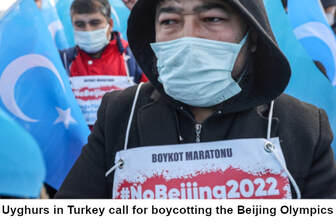
The vision of the International Olympic Committee (IOC) is to “Build a Better World through Sport.” Awarding the upcoming Winter Games to Beijing might be building a better world for the Chinese Communist Party Politburo, but certainly not for the estimated 1 million Uyghurs currently incarcerated in re-education (a.k.a., concentration) camps or the 7.76 million Hong Kong residents whose political and civil rights are being brutally suppressed by Beijing.
By blithely overlooking these rampant human rights abuses, the IOC tacitly endorses them. Of course, bolstering repressive regimes is nothing new for the IOC. Its “hear-no-evil, speak-no-evil, see-no evil” philosophy dates back at least to the “Nazi Olympics” in Berlin in 1936, when it meekly kow-towed to Adolf Hitler and the depraved concept of Aryan supremacy he was peddling. To its eternal shame, its American subsidiary, the U.S. Olympic Committee (USOC), headed by the overtly anti-Semitic Avery Brundage, kept one of America’s best shotputters off the team altogether and, once in Berlin, prohibited Sam Stoller and Marty Glickman, two of the fastest humans in the world, from competing in the 4 x 100 meter relay. All three banned athletes were Jewish. Brundage did not want to offend his Nazi hosts. Interestingly, the Nazis later awarded his construction company the contract to build the German embassy in Washington. He was also rewarded by election to the IOC presidency.
Hypocrisy and allegations of corruption are nothing new to the IOC. For most of modern Olympic history, it promoted a flagrant double standard, insisting that American and other Western athletes had to be “pure” amateurs while turning a blind eye to Soviet bloc athletes who were full-time professionals. American athletes had to struggle to make ends meet while their rivals were paid.
Hosting an Olympics means massive and skyrocketing costs. Longer-term economic benefits have proven dubious. Consequently, fewer cities now compete to play host, increasingly aware that the economic benefits are doubtful. This has led to fewer cities interested in hosting. A 2012 Oxford University study calculated that each Summer Olympics since 1976 suffered cost overruns averaging 252 percent. The 1976 Summer Olympics in Montreal became the poster child for the fiscal black hole of hosting. Its projected cost of $124 million was off by billions, and it took its taxpayers almost 30 years to pay off the $1.5 billion in debt it incurred. Rio (2016) still owes more than $2 billion. In 1972, Denver became the only city to bail on hosting after a voter referendum defeated public spending for the games. Out of 52 Olympic Games, only one host city came through the painful ordeal with a profit (Los Angeles, 1984). Although nothing has yet been proven, credible allegations of payoffs to IOC executives in return for awarding the games to host cities are rife.
In contrast, the IOC and USOC (both nonprofits) have done very well financially. The IOC often hauls in over $3 billion in Olympic years, enabling it to pay numerous Committee executives salaries well into six figures. The USOC has at least 15 executives who earn more than $250,000 per year. Meanwhile, both Committees exploit athletes, treating them as pawns, throwing them peanuts and milking their exertions for every penny they can squeeze out of them. In order to train, many athletes have had to survive on food stamps.
Seeing an opportunity to cash in even more, the IOC launched the first Winter Olympics in 1924. The first Winter Games attracted only Scandinavian countries. While more countries participate today, they are few in number compared to the Summer Olympics where the sports contested are far more universal. The Winter Games exclude virtually the entire group of nations located in the tropics and subtropics, where biathlon, bobsledding (exception: Jamaica), luge, curling and skiing don’t exist for lack of snow and cold weather. Beijing has had to make virtually 100 percent of the necessary snow artificially for this year’s games.
In the 21st century, the IOC scheduled the Winter Games to take place in between the Summer Games, not wanting to wait four full years for its next financial windfall.
Adding to the reluctance to host is the risk of violence. Hundreds of protestors were killed by government militias just prior to the 1968 Mexico City Games. The Arab terrorist group, Black September, murdered 13 Israeli athletes during the 1972 Munich Games. Atlanta in 1996 witnessed a bomb attack resulting in death and injuries. In all three cases, the IOC absolved itself of any responsibility.
The hypocrisy that consumes the IOC and USOC is also evident in its treatment of doping athletes. Ignoring the use of performance-enhancing drugs (PEDs) and other cheating such as blood doping has a long Olympic history. In the 1970s, the East German teams were swimming in PEDs and winning swimming and track gold medals as a result. Despite finding that Russia today harbors the world’s most egregious doping program, the IOC nevertheless allows Russian athletes to participate provided they do so “unattached.”
Finally, the IOC and USOC also look the other way when accusations of abuse pinpoint individual sport governing bodies, such as USA Gymnastics, which failed to keep its athletes safe from years of sexual predation by its team doctor, Larry Nasser.
I don’t know if the Olympic Movement can be fixed. One simple reform that makes sense would be to hold the Games in the same or a rotating number of cities that already have the requisite infrastructure without having to shell out billions. It will require a great deal of purging in order to clean up the rest of the Olympic mess. Eliminating the Olympics altogether would be a terrible shame for the athletes.
Dick Hermann
January 29, 2022


 RSS Feed
RSS Feed